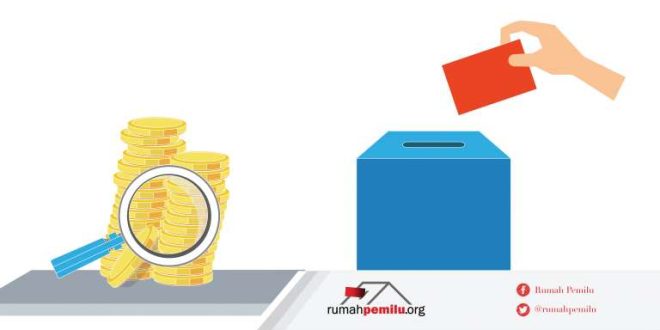Campaign fund reports submitted by election participants are considered to be mere administrative formalities. Based on the findings of Indonesia Corruption Watch (ICW) and the Association for Elections and Democracy (Perludem), the Campaign Fund Receipt and Expenditure Report (LPPDK) submitted on March 7, 2024, still does not show transparency and honesty of election participants. This is based on the results of a study by comparing the amount of campaign funds recorded in the LPPDK, with campaign reports in the Campaign and Campaign Fund Information System (Sikadeka).
“When viewed from the types of campaign fund expenditures that include eight campaign methods and are listed in the LPPDK, there are candidate pairs that do not report campaign fund expenditures in several forms of campaign methods at all,” said ICW researcher Seira Tamara in an online publication of research findings entitled ‘Questioning Campaign Fund Transparency in the 2024 Elections and the Improvement Agenda for the 2024 Elections’ (12/7).
The number one pair, Anies-Muhaimin, in their report did not include the amount of expenditure for the campaign method of public meetings, the production of advertisements in print mass media, electronic mass media, social media, and network media, and campaign props. When juxtaposed with the general meeting campaign report in Sikadeka, Anies-Muhaimin carried out the general meeting campaign method five times in several areas such as Banyuwangi, Lumajang, DIY, Wonosobo, and Sukabumi. Even the last grand campaign at the Jakarta International Stadium (JIS) on Saturday, February 10, 2024 was not recorded in the campaign report and campaign fund expenditure. Meanwhile, candidate Prabowo-Gibran spent IDR 21.62 billion and candidate number 03, Ganjar Pranowo-Mahfud MD, IDR 124.78 billion for public meetings.
Another finding is that the Prabowo-Gibran pair number 02 did not include the amount of the campaign fund expenditure report for the face-to-face meeting campaign method. Whereas in the Sikadeka campaign report, the Prabowo-Gibran pair was recorded to have conducted face-to-face meeting campaigns 74 times out of a total of 100 face-to-face meeting campaigns. Meanwhile, the Anies-Muhaimin pair spent 1.12 billion and Ganjar-Mahfud were recorded to have spent 1.83 billion for the face-to-face meeting campaign method.
In the 2024 presidential election, ICW and Perludem also monitored campaign funds on social media, through Meta’s ads library feature to view paid advertisements from November 16 – December 15, 2023. In their findings, the Anies-Muhaimin candidate pair spent Rp. 444,435,431 in advertising costs with a total of 1,394 advertisements on the Meta social media platform, but did not report at all in the LPPDK. Meanwhile, the Prabowo-Gibran pair spent Rp. 778,930,409 with 1,300 advertisements and the Ganjar-Mahfud pair spent Rp. 829,163,419 with 6,369 advertisements on Meta social media.
“Ads originating from non-official accounts can be categorized as campaign fund donations in the form of goods or services used to campaign for their candidates. But unfortunately, this was not recorded by candidate 01,” said Perludem Researcher Heroik Pratama.
According to him, even though the Campaign Props (APK) are donations from volunteers, these donations can be reported in the LPPDK. There should be a recording mechanism made internally by the winning team, which requires that outside the winning team or volunteers report the campaign funds they spend.
The Dispute over the 2024 Pileg Campaign Fund Spending
In legislative elections, according to the provisions of Article 43 PKPU No. 18 of 2023, the accounting of campaign funds carried out by political parties includes the accounting of receipts and expenditures of Campaign Funds for candidates for members of the DPR, provincial DPRD, and district / city DPRD. Therefore, reports on the receipts and expenditures of legislative candidates at each level are managed by political parties.
From the results of monitoring the LPPDK of political parties, ICW and Perludem still found a number of nominal inclusions of expenditures of Rp. 0, for example in the distribution of campaign materials and APK candidates. All political parties participating in the election, or 18 parties, compactly wrote the amount of Rp. 0 for the two types of expenses for the distribution of campaign materials and APK.
“This is a very strange thing because on various roads, APKs are filled with both banners and posters, and not only APKs that promote candidates, but also political parties. That is why in the LPPDK element, there are APKs for parties and candidates, but all of them write 0 rupiah for APK installation,” said Seira.
Furthermore, in the campaign fund expenditure element for the design of campaign materials and APKs, 11 parties did not submit, only 7 of the 18 political parties participating in the election included the amount of expenditure costs. Even though there were a lot of campaign props perched on the road during the 2024 election campaign. The 11 parties that did not submit the component were PKB, PDIP, Labor Party, Gelora Party, PKN, Hanura Party, PAN, PBB, Democratic Party, PERINDO, and Ummat Party.
Worse, according to Seira, in the expenditure component in the form of activities such as general meetings, limited meetings, and face-to-face meetings, there are many political parties that list expenditures of Rp. 0. He explained that 12 of the 18 political parties participating in the 2024 Election did not report campaign costs for general meeting campaigns. The 12 parties are PKB, PDIP, NasDem Party, Golkar Party, Gelora Party, PKS, PKN, Garuda Party, PAN, PBB, Perindo, and Ummat Party. In fact, referring to the General Election Commission (KPU) Sikadeka, the NasDem Party was recorded to have held one public meeting on March 6, 2024.
While in the face-to-face campaign, as many as 15 parties did not include the amount of expenditure, only the Golkar Party, Labor Party and PSI reported face-to-face campaign expenditures. Meanwhile, in Sikadeka, 11 of the 15 parties have held face-to-face campaigns, namely PKB, NasDem, PKS, Gerindra, Demokrat twice, PDIP, PKN, Perindo, Hanura, PAN, and Ummat Party once.
“It feels impossible when at every level of nomination, no public meetings are held,” said Seira.
Seira regretted that the KPU and Bawaslu did not take any action against political parties that violated the Election Law and PKPU No.18/2023. Even though the regulation requires each election participant to submit a report on the receipt and expenditure of campaign funds honestly.
Political Party Audit Report
Based on the results of the public accounting firm (KAP) audit of the LPPDK, there are four political parties participating in the 2024 elections that do not comply with the material aspects of reporting. The four parties are PKB, Ummat Party, Garuda Party, and Labor Party. In the case of PKB, it was found that campaign funds were used to finance party witnesses during the count, even though this is not allowed by regulation. In Sikadeka, PKB was recorded to have spent 1.4 billion in witness funds.
Then, the Garuda Party was declared non-compliant because there was a difference in the amount of receipts and expenditures in the Initial Campaign Fund Report (LADK) and the special campaign fund account (RKDK) of 4.6 million rupiah. In addition, there is also a difference in the closing balance in the RKDK and LADK and donations of services amounting to 2.3 billion rupiah that are not listed on the LADK Form 2. Garuda Party was also recorded as non-compliant in the accounting of LADK, according to Article 47 paragraph (2) PKPU No.18/2023, the closing of LADK accounting on January 6, 2024, while Garuda Party closed its accounting on January 5, 2024.
“The Garuda Party also turned out to be late in submitting the Campaign Fund Contribution Receipt Report (LPSDK), they submitted it on February 29, whereas the LPSDK should have been submitted between November 28 and February 11, 2024,” Seira explained.
Just like the Garuda Party, the Ummat Party was also declared non-compliant in material aspects because the LADK accounting period did not comply with the rules. The evidence of service receipts and expenditures submitted in the LADK and LPPDK was also considered by KAP to be inadequate. Meanwhile, in the case of the Labor Party, KAP did not find any receipt of campaign funds in the RKDK before being used for campaign activities. Some proof of receipt and expenditure transactions also could not be found by KAP.
ICW and Perludem encouraged the KPU and Bawaslu to take action against the KAP examination. They regretted that Bawaslu did not conduct meaningful supervision of campaign funds. Bawaslu should be able to present comparable campaign cost data to be compared with the LPPDK submitted by election participants.
“We also regret that there is no comparative data from Bawaslu after the LPPDK audit results are published. We really need that as a comparison in the midst of LPPDK which is not reported honestly,” regretted Seira.
Heroik Pratama also asked Bawaslu to collect data on campaign costs in the 2024 Simultaneous Pilkada. According to him, Bawaslu’s ranks up to the TPS level can be utilized to monitor campaign funds. He suggested that Bawaslu also explore political advertising transparency channels such as the Meta Ad Library, to compare the costs of political advertisements reported by Pilkada participants with the facts on the ground.
“So that later when a regional head candidate pair reports campaign funds, Bawaslu already has comparable data, how many APKs are installed, how many advertisements are promoted. Bawaslu can also monitor social media through the Facebook Ad Library, both those promoted by the winning team and by volunteers,” said Heroik. []
 Rumah Pemilu Indonesia Election Portal
Rumah Pemilu Indonesia Election Portal




